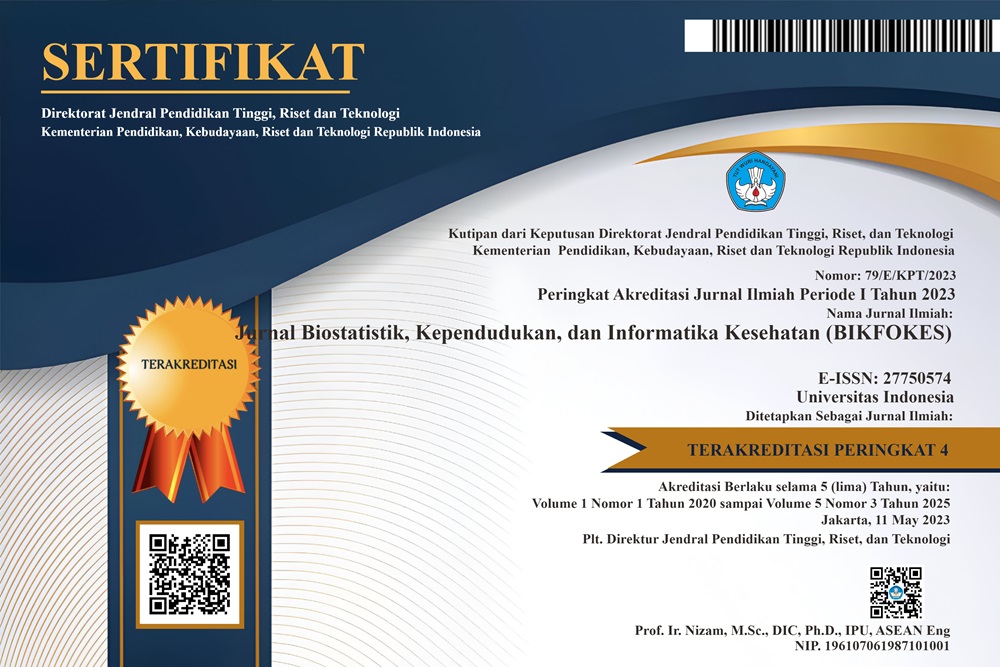Abstract
Penggunaan internet dan aplikasi kesehatan seluler semakin meningkat. Banyak aplikasi kesehatan seluler sekarang menargetkan penderita penyakit kronis dan penyakit tidak menular sebagai sarana yang efektif untuk perubahan perilaku. Tujuan penelitian ini adalah untuk mengetahui pengaruh penggunaan mHealth terhadap perubahan perilaku kesehatan pada penderita penyakit kronis dan penyakit tidak menular. Metode telaah sistematis terhadap jurnal yang terbit dalam 10 tahun terakhir di database IEEE Explorer, Elsevier, dan ScienceDirect, dengan kriteri disain eksperimen randomise control design (RCT). Hasil penelitian memperlihatkan bahwa dari 4 jurnal yang memenuhi kriteria inklusi, 3 jurnal menyimpulkan bahwa penggunaan mHealth yang mengimplementasikan teori perubahan perilaku kesehatan, secara signifikan mempengaruhi perubahan positif perilaku kesehatan pada penderita penyakit tidak menular, sedangkan 1 jurnal menyatakan bahwa mhealth tidak berpengaruh secara signifikan terhadap perubahan perilaku kesehatan penderita HIV. Kesimpulannya adalah penggunaan mHealth secara konsisten dan dalam jangka panjang (minimal dalam 1 tahun), serta pesan teks yang dipersonalisasikan dapat mengubah perilaku kesehatan individu penderita penyakit tidak menular secara signifikan. Disarankan penelitian mHealth yang berdasarkan teori perubahan perilaku kesehatan dapat menjadi pendekatan yang baik untuk intervensi perilaku dan dapat diterapkan pada promosi kesehatan masyarakat. Perlu mempertimbangkan teori perilaku yang sesuai dan metode penyampaian informasi yang relevan dengan kondisi pasien dan jenis penyakitnya.
References
1. Kemp S. Digital 2019: Global Digital Overview [Internet]. 2019. Available from: https://datareportal.com/reports/digital-2019-global-digital-overview
2. Cho YM, Lee S, Islam SMS, Kim SY. Theories applied to m-health interventions for behavior change in low- and middle-income countries: A systematic review. Telemedicine and e-Health. 2018;24(10):727–41.
3. U.S. Food & Drug Administration. Device Software Functions Including Mobile Medical Applications | FDA [Internet]. 2019. Available from: https://www.fda.gov/medical-devices/digital-health-center-excellence/device-software-functions-including-mobile-medical-applications
4. Pharow P, Blobel B, Ruotsalainen P, Petersen F, Hovsto A. Portable devices, sensors and networks: Wireless personalized eHealth services. In: Studies in Health Technology and Informatics. 2009. p. 1012–6.
5. Abegunde DO, Mathers CD, Adam T, Ortegon M, Strong K. The burden and costs of chronic diseases in low-income and middle-income countries. Lancet. 2007;370(9603):1929–38.
6. Fogarty International Center. Chronic, noncommunicable diseases (NCDs) news, resources and funding for global health researchers - Fogarty International Center @ NIH [Internet]. Available from: https://www.fic.nih.gov/ResearchTopics/Pages/ChronicDiseases.aspx
7. Ryan P. Integrated theory of health behavior change: Background and intervention development. Clinical Nurse Specialist. 2009;23(3):161–70.
8. WHO. mHealth: New horizons for health through mobile technologies: second global survey on eHealth. WHO; 2011.
9. Silva BMC, Rodrigues JJPC, de la Torre Díez I, López-Coronado M, Saleem K. Mobile-health: A review of current state in 2015. Journal of Biomedical Informatics. 2015;56:265–72.
10. Parkerson GR, Connis RT, Broadhead WE, Patrick DL, Taylor TR, Tse CKJ. Disease-specific versus generic measurement of health-related quality of life in insulin-dependent diabetic patients. Medical Care. 1993;31(7):629–39.
11. Glanz K, Rimer BK, Viswanath K. Health Behavior and Health Education: Theory, Research, and Practice - Google Buku. Fourth. New Jersey: John Wiley & Sons; 2008.
12. Rubinstein A, Miranda JJ, Beratarrechea A, Diez-Canseco F, Kanter R, Gutierrez L, et al. Effectiveness of an mHealth intervention to improve the cardiometabolic profile of people with prehypertension in low-resource urban settings in Latin America: A randomised controlled trial. The Lancet Diabetes and Endocrinology. 2016;4(1):52–63.
13. Kamal AK, Shaikh Q, Pasha O, Azam I, Islam M, Memon AA, et al. A randomized controlled behavioral intervention trial to improve medication adherence in adult stroke patients with prescription tailored Short Messaging Service (SMS)-SMS4Stroke study. BMC Neurology. 2015;15(1):212.
14. Mbuagbaw L, Thabane L, Ongolo-Zogo P, Lester RT, Mills EJ, Smieja M, et al. The Cameroon Mobile Phone SMS (CAMPS) Trial: A Randomized Trial of Text Messaging versus Usual Care for Adherence to Antiretroviral Therapy. PLoS ONE. 2012;7(12):e46909.
15. Islam SMS, Lechner A, Ferrari U, Seissler J, Holle R, Niessen LW. Mobile phone use and willingness to pay for SMS for diabetes in Bangladesh. In: Journal of Public Health (United Kingdom). 2016. p. 163–9.
16. Janz NK, Becker MH. The Health Belief Model: A Decade Later. Health Education & Behavior. 1984;11(1):1–47.
17. Ajzen I. The theory of planned behavior. Organizational Behavior and Human Decision Processes. 1991 Dec 1;50(2):179–211.
18. Melzner J, Heinze J, Fritsch T. Mobile Health Applications in Workplace Health Promotion: An Integrated Conceptual Adoption Framework. Procedia Technology. 2014;16:1374–82.
19. Bandura A. Social Cognitive Theory: An Agentic Perspective. Annual Review of Psychology. 2001;52(1):1–26.
20. Leventhal H, Cameron L. Behavioral theories and the problem of compliance. Patient Education and Counseling. 1987 Oct 1;10(2):117–38.
Recommended Citation
Sari, Nur Ighwana and Besral, Besral
(2020)
"Penggunaan mHealth Mampu Memperbaiki Perilaku Kesehatan Pasien Penyakit Tidak Menular,"
Jurnal Biostatistik, Kependudukan, dan Informatika Kesehatan: Vol. 1:
No.
1, Article 6.
DOI: 10.7454/bikfokes.v1i1.1005
Available at:
https://scholarhub.ui.ac.id/bikfokes/vol1/iss1/6


